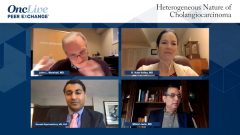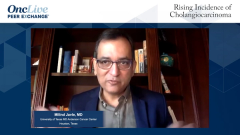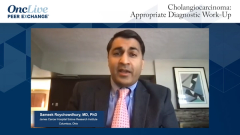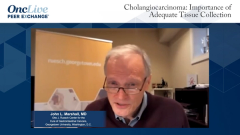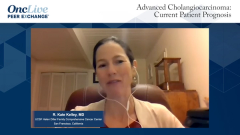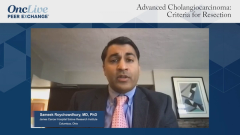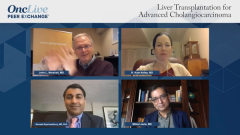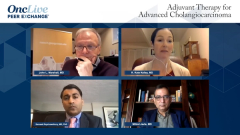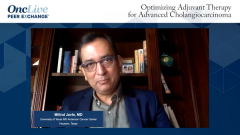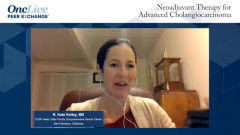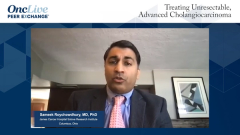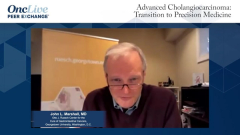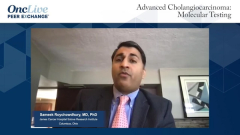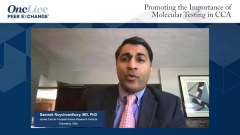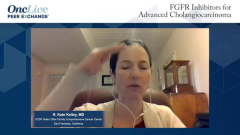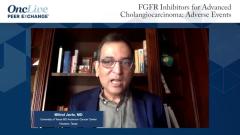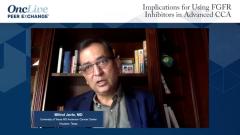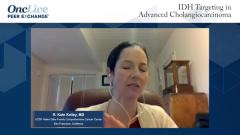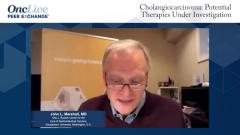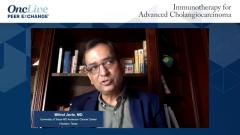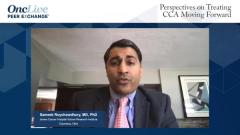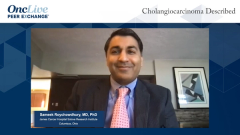
Adjuvant Therapy for Advanced Cholangiocarcinoma
Current treatment approaches for advanced cholangiocarcinoma, despite current gaps that can be considered in the adjuvant setting, as highlighted by GI oncologists.
Episodes in this series

John L. Marshall, MD: Katie, let me come back to you. We’ve been talking about 3 different cancers in this family: intrahepatic, extrahepatic, and gallbladder. Let’s say they get resected and then come to us for adjuvant therapy consideration. We’ve been talking about splitting those molecularly in the metastatic setting. In the adjuvant setting, are we splitting them? Do we have different strategies for each type, or are we lumping them still?
R. Kate Kelley, MD: Great question. The data are really confusing in the adjuvant space, and we don’t have a strong consensus on the right approach. My approach, as well as the best data we have, is from the BILCAP trial, which was conducted in the United Kingdom and randomized patients to capecitabine or no treatment after surgery—including intrahepatic, extrahepatic, and gallbladder. Though intention-to-treat analysis was negative, it showed a turn towards positive, even if not statistically significant. However, with preplanned sensitivity analyses adjusting for prognostic variables, the study did reach a positive improvement in recurrence-free survival that was substantial on the order of 50 months vs 36 months for patients who received 6 months of adjuvant capecitabine.
With that nuance of statistical difference between the intention-to-treat vs per protocol and preplanned sensitivity analyses, the study was positive—again, with those adjustments—and showed favorable tolerability. We know that adjuvant capecitabine has a relatively acceptable risk proposition. Given the high risk for recurrence in this population, that is my standard, which is included in NCCN [National Comprehensive Cancer Network] Guidelines and other guidelines as an option. Again, we are working with imperfect data.
Other combination chemotherapy trials in the adjuvant space have not been positive, including GEMOX [gemcitabine + oxaliplatin] and CIS [cisplatin]/5-FU [fluorouracil]. Some of those are all-comers, from intrahepatic to extrahepatic to gallbladder, and some are specifically just in extrahepatic. There’s an ongoing trial looking at GEM [gemcitabine]/CIS vs capecitabine—the randomized phase 3 ACTICCA trial—that we will look to for further results.
To your question, I will specifically talk about extrahepatic disease, where we have some unique anatomic considerations, like margins in particular, when you get in this very tight space of the distal bile duct near the pancreas head. There is another important trial in the United States that does inform our practice, particularly for extrahepatic disease; that was the SWOG 0809 trial, S0809, looking at the combination of GEM + CAPE [capecitabine] chemotherapies, followed by chemoradiation. That was not a randomized trial. It had only about 80 patients enrolled, but it did show improvement in a multicenter setting compared with historical outcomes. My personal approach is the same as the guidelines when it comes to patients with extrahepatic cholangiocarcinoma who have a high risk for local recurrence, such as a positive margin, positive regional nodes, positive perineural invasion. I consider the S0809 regimen without randomized data.
John L. Marshall, MD: Sameek, what’s your take on that with your patients?
Sameek Roychowdhury, MD, PhD: Katie nicely summarized some of the studies looking at adjuvant therapy. The bottom line is anyone with a bile duct cancer that gets surgery has a very high risk for recurrence no matter which way you look at it.
John L. Marshall, MD: Regardless of stage, size, etc?
Sameek Roychowdhury, MD, PhD: Yes. Capecitabine is relatively well tolerated with some nuances, but after 6 months or so, people do well. The data match the diversity of the disease, meaning there are some patients who really benefit from capecitabine. We don’t know how to pick those patients at the moment, so everybody needs to get some type of adjuvant therapy, whether it’s capecitabine or another. That speaks to the heterogeneity of the disease and trying to figure out some biomarker to help us choose. Everyone deserves therapy, but many of them are not benefiting from capecitabine. The majority are not hurt by the therapy.
I’m looking forward to the next adjuvant settings. Can we match patients more appropriately? Are the repair defects in the DNA repair that we can help stratify patients? Are there other molecular markers for different adjuvant therapies we can offer? Being a rare cancer altogether and “slicing and dicing” it into smaller molecular subsets makes these studies hard, but it stems from the earlier topic we talked about: Is cholangiocarcinoma changing?
Today, there is an international cholangiocarcinoma research network. There’s a cholangiocarcinoma foundation that was formally a poster child for precision oncology in melanoma, then lung cancer, and now cholangiocarcinoma. The ability to do these types of molecularly stratified studies, even in the adjuvant setting, is coming to fruition. Can we choose therapies more rationally and see if we can pick the right patient for the right adjuvant therapy, or even neoadjuvant therapy, to try and get people closer to a resection when they previously could not?
Transcript Edited for Clarity


